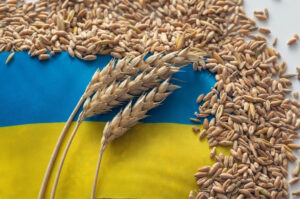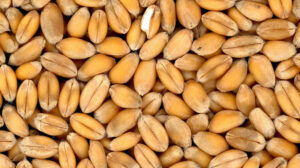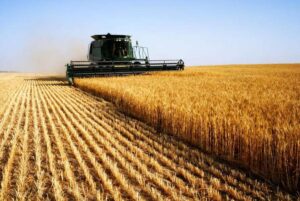
The global grain harvest in 2023 could be at the level of the record-breaking 2021, FAO (the UN Food and Agriculture Organization) predicts.
According to its review, the estimate of the global harvest for this year in September compared to July (the review was not released in August) was reduced by 4 million tons. Despite this, the global harvest may be 0.9% higher than last year’s and amount to 2 billion 815 million tons, which corresponds to the record figure for 2021.
Thus, the forecast of wheat harvest was reduced by 2.2 million tons to 781.1 million tons. “It is expected that global wheat production will decrease by 2.6% compared to last year, but, nevertheless, it will be the second highest figure in the history of observations,” the review says. The largest decline was in production in Canada and the EU due to dry weather. The wheat harvest forecast in China has been lowered due to heavy rains in a number of key grain-producing regions. This decrease was partially offset by an increase in the forecast in the United States, India and Ukraine, “as indicated by the latest data provided by the governments of these countries on a more abundant harvest than previously expected.”
The forecast of feed grain harvest was lowered by 1.3 million tons to 1 billion 511 million tons, which is mainly due to a decrease in barley and oat harvests. However, this figure is 2.7% higher than last year. Thus, the estimate of barley harvest has been reduced by 2.9 million tons to 143.8 million tons (5.6% lower than last year). The oat harvest will be the lowest in 11 years – 23.1 million tons.
At the same time, corn production may reach a record high of 1 billion 215 million tons. The forecast has been raised by 3.6 million tons, mainly due to “richer than expected harvests in Brazil and Ukraine.” This will more than compensate for the lower forecast for corn harvest in the US and EU.
The FAO estimates this year’s rice harvest at 523.2 million tons. This is 500 thousand tons lower than the July forecast, but 1.1% higher than the harvest last season.

Following the meeting of the coordination platform on Ukrainian grain exports, no decision was made on whether or not to extend the current temporary ban on grain imports to Poland, Hungary, Romania, Slovakia and Bulgaria, which expires on September 15.
This was reported to Interfax-Ukraine on Wednesday after the 9th meeting of the joint coordination platform, chaired by the head of the cabinet of the Vice President of the European Commission Valdis Dombrovskis, Mr. Hager.
According to her, the first part of the meeting was attended by representatives of five member states, Ukraine, the Republic of Moldova and the Commission. “The Commission presented the latest forecasts of the market situation in terms of harvest, trade and prices. Countries were invited to share the latest information. The platform also discussed how to increase storage capacity and reduce border crossing time. Finally, they exchanged views on short-term actions to facilitate trade flows and on ways to support transport,” the EC representative said about the content of the first part of the platform meeting.
According to Garcia, the second part of the meeting, which was attended by representatives of Estonia, Latvia, Lithuania, Greece, Italy and Croatia, was devoted to alternative routes.
“In the context of this meeting, the Commission informed that no decision has yet been made on preventive measures, the phased abolition of which is scheduled for September 15, 2023. In any case, the Platform will continue to meet regularly and monitor grain imports from Ukraine,” the European Commission representative stated.
As you know, in May 2022, the EU decided to temporarily suspend import duties, quotas and trade remedies on Ukrainian exports to the European Union – known as autonomous trade measures – to help alleviate the difficulties faced by Ukrainian producers and exporters after the Russian invasion. At the same time, following logistical problems in Bulgaria, Hungary, Poland, Romania, and Slovakia caused by imports of wheat, corn, rapeseed, and sunflower seeds originating in Ukraine, exceptional and preventive measures on their imports came into force on May 2, 2023, and were extended on June 5.

The European Commission may extend for another two months the embargo on imports of Ukrainian grain, including wheat, corn, rapeseed and sunflower seeds, to Poland, Hungary, Romania, Slovakia and Bulgaria.
A source close to the negotiations told Interfax-Ukraine on Wednesday in Brussels.
As you know, a meeting of the coordination platform is taking place in Brussels on Wednesday with the participation of the countries concerned.
“It is proposed to extend the ban on imports of Ukrainian grain for two months. It is not yet known when the official decision will be made,” he said.
At the same time, the deadline for the ban on Ukrainian grain imports expires on September 15.
As you know, in May 2022, the EU decided to suspend import duties, quotas and trade remedies on Ukrainian exports to the European Union – known as autonomous trade measures – to help alleviate the difficulties faced by Ukrainian producers and exporters after the Russian invasion. At the same time, following logistical problems in Bulgaria, Hungary, Poland, Romania, and Slovakia caused by imports of wheat, corn, rapeseed, and sunflower seeds originating in Ukraine, exceptional and preventive measures on their imports came into force on May 2, 2023, and were extended on June 5.
A day earlier, on September 12, European Commissioner for Agriculture Janusz Wojciechowski spoke in the European Parliament about the need to maintain the ban on imports of wheat, corn, rapeseed and sunflower seeds from Ukraine to Bulgaria, Hungary, Poland, Romania and Slovakia. According to him, this decision has proved to be effective and should be extended after September 15 with the simultaneous expansion of the Solidarity Roads for the transit of these Ukrainian products. “We have found a solution that, firstly, stabilized the market in these (five) countries, and, secondly, allowed us to increase transit from 2.9 million tons before the ban from Ukraine to 3.2 million tons after the ban was introduced,” he said.
According to the EC, 44 million tons of agricultural products have already been transported from Ukraine via the road and rail “Solidarity Roads” of these countries, and according to current forecasts for this marketing year 2023-2024, Ukraine needs to export 56 million tons of grain, or 4.7 million tons on average per month. “The Black Sea is blocked, and no one knows if it will be unblocked by Russia. Russia knows what it is doing in this regard, what criminal activities it is conducting, and it is using food as a weapon. But we are able to help Ukraine export these 4.7 million tons by land through the Solidarity Corridors. We just need to improve and expand these corridors,” the European Commissioner emphasized.
Wojciechowski mentioned Baltic ports as new routes: Lithuania, Klaipeda, Riga, and the ports of the Adriatic, as Romania is practically unable to increase transit.

Successful exports of Ukrainian grain under the Black Sea Grain Initiative have helped to reduce world prices and strengthen food security, according to a report published on Twitter by the Ministry of Defense of the United Kingdom of Great Britain and Northern Ireland on Friday.
“During this initiative, more than 32 million tons of food entered the world market, and the food price index fell by 23% compared to its peak in March 2022. Developing countries have particularly benefited from lower prices, as well as from direct grain imports from Ukraine,” the statement said.
At the same time, Russia’s withdrawal from the Black Sea Grain Initiative has led to a reduction in exports from Ukraine, which, according to British intelligence, “is a clear attempt to degrade the Ukrainian economy and its ability to maintain its military capabilities.”
The report emphasizes that the agricultural sector accounted for 40% of Ukraine’s exports before the war and remains vital to the country’s economy. In total, food exports from Ukraine amounted to $28 billion in 2021.
“Ukraine has succeeded in using alternative methods of grain exports, such as river, rail, and road transport; however, it is unlikely that this will match the capacity of the Black Sea export routes,” the British intelligence service said.

Ukrainian farmers have already harvested 34 million tons of grain, Prime Minister Denys Shmyhal said.
“The harvest is underway. As of today, 34 million tons of grain have been harvested. In particular, 22 million tons of wheat,” Shmyhal said at a government meeting on Friday.
According to the prime minister, the domestic demand is about 6-7 million tons per year, so Ukraine feels quite confident in food security.
“We continue to work on expanding our export potential. It is important for our economy and important for global food security,” he added.